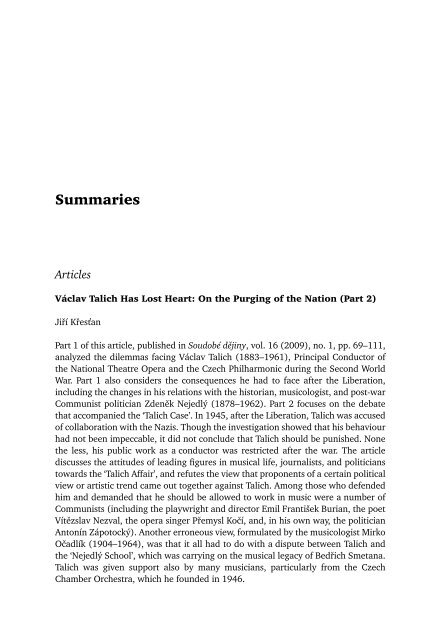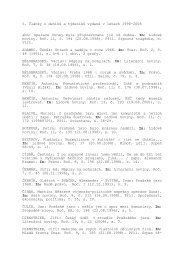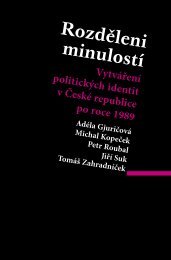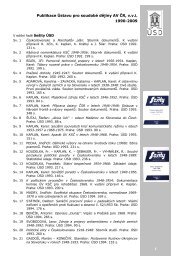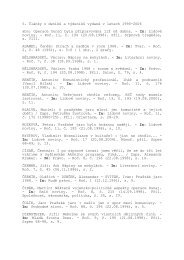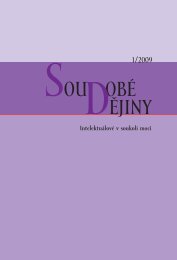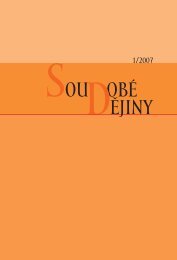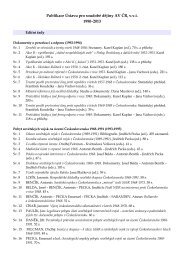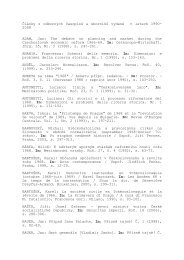- Page 1 and 2:
2-3/2009 SOU D OBÉ ĚJINY Politick
- Page 3 and 4:
234 Soudobé dějiny XV / 2 Z POVĚ
- Page 5 and 6:
236 Soudobé dějiny XV / 2 Autoři
- Page 7 and 8:
238 Soudobé dějiny XV / 2 a v prv
- Page 9 and 10:
240 Soudobé dějiny XV / 2 Obsah S
- Page 11 and 12:
242 Soudobé dějiny XV / 2 Mirosla
- Page 13 and 14:
244 Soudobé dějiny XVI / 2-3 Neko
- Page 15 and 16:
246 Soudobé dějiny XVI / 2-3 či
- Page 17 and 18:
248 Soudobé dějiny XVI / 2-3 vět
- Page 19 and 20:
250 Soudobé dějiny XVI / 2-3 Mila
- Page 21 and 22:
252 Soudobé dějiny XVI / 2-3 Vác
- Page 23 and 24:
254 Soudobé dějiny XVI / 2-3 se o
- Page 25 and 26:
256 Soudobé dějiny XVI / 2-3 Vác
- Page 27 and 28:
258 Soudobé dějiny XVI / 2-3 Vác
- Page 29 and 30:
260 Soudobé dějiny XVI / 2-3 Trva
- Page 31 and 32:
262 Soudobé dějiny XVI / 2-3 že
- Page 33 and 34:
264 Soudobé dějiny XVI / 2-3 tost
- Page 35 and 36:
266 Soudobé dějiny XVI / 2-3 Tali
- Page 37 and 38:
268 Soudobé dějiny XVI / 2-3 dent
- Page 39 and 40:
270 Soudobé dějiny XVI / 2-3 se p
- Page 41 and 42:
272 Soudobé dějiny XVI / 2-3 Jedn
- Page 43 and 44:
274 Soudobé dějiny XVI / 2-3 Spí
- Page 45 and 46:
276 Soudobé dějiny XVI / 2-3 Poli
- Page 47 and 48:
278 Soudobé dějiny XVI / 2-3 O je
- Page 49 and 50:
280 Soudobé dějiny XVI / 2-3 „N
- Page 51 and 52:
282 Soudobé dějiny XVI / 2-3 a n
- Page 53 and 54:
284 Soudobé dějiny XVI / 2-3 moci
- Page 55 and 56:
286 Soudobé dějiny XVI / 2-3 Pře
- Page 57 and 58:
288 Soudobé dějiny XVI / 2-3 Obč
- Page 59 and 60:
290 Soudobé dějiny XVI / 2-3 odch
- Page 61 and 62:
292 Soudobé dějiny XVI / 2-3 nác
- Page 63 and 64:
294 Soudobé dějiny XVI / 2-3 Pře
- Page 65 and 66:
296 Soudobé dějiny XVI / 2-3 dův
- Page 67 and 68:
298 Soudobé dějiny XVI / 2-3 jist
- Page 69 and 70:
300 Soudobé dějiny XVI / 2-3 Havl
- Page 71 and 72:
302 Soudobé dějiny XVI / 2-3 ost
- Page 73 and 74:
304 Soudobé dějiny XVI / 2-3 ce 1
- Page 75 and 76:
306 Soudobé dějiny XVI / 2-3 Pře
- Page 77 and 78:
308 Soudobé dějiny XVI / 2-3 Hier
- Page 79 and 80:
310 Soudobé dějiny XVI / 2-3 Kře
- Page 81 and 82:
312 Soudobé dějiny XVI / 2-3 neza
- Page 83 and 84:
314 Soudobé dějiny XVI / 2-3 stra
- Page 85 and 86:
316 Soudobé dějiny XVI / 2-3 Vác
- Page 87 and 88:
318 Soudobé dějiny XVI / 2-3 Znov
- Page 89 and 90:
320 Soudobé dějiny XVI / 2-3 koř
- Page 91 and 92:
322 Soudobé dějiny XVI / 2-3 žen
- Page 93 and 94:
324 Soudobé dějiny XVI / 2-3 Vác
- Page 95 and 96:
326 Soudobé dějiny XVI / 2-3 s ku
- Page 97 and 98:
328 Soudobé dějiny XVI / 2-3 stra
- Page 99 and 100:
330 Soudobé dějiny XVI / 2-3 V Ob
- Page 101 and 102:
332 Soudobé dějiny XVI / 2-3 zaji
- Page 103 and 104:
334 Soudobé dějiny XVI / 2-3 Obč
- Page 105 and 106:
336 Soudobé dějiny XVI / 2-3 Uká
- Page 107 and 108:
338 Soudobé dějiny XVI / 2-3 zast
- Page 109 and 110:
340 Soudobé dějiny XVI / 2-3 mezi
- Page 111 and 112:
342 Soudobé dějiny XVI / 2-3 Slav
- Page 113 and 114:
344 Soudobé dějiny XVI / 2-3 za l
- Page 115 and 116:
346 Soudobé dějiny XVI / 2-3 nám
- Page 117 and 118:
348 Soudobé dějiny XVI / 2-3 nala
- Page 119 and 120:
350 Soudobé dějiny XVI / 2-3 o nu
- Page 121 and 122:
352 Soudobé dějiny XVI / 2-3 Smě
- Page 123 and 124:
354 Soudobé dějiny XVI / 2-3 K vn
- Page 125 and 126:
356 Soudobé dějiny XVI / 2-3 pře
- Page 127 and 128:
358 Soudobé dějiny XVI / 2-3 voto
- Page 129 and 130:
360 Soudobé dějiny XVI / 2-3 na n
- Page 131 and 132:
362 Soudobé dějiny XVI / 2-3 1 19
- Page 133 and 134:
364 Soudobé dějiny XVI / 2-3 jád
- Page 135 and 136:
366 Soudobé dějiny XVI / 2-3 Nen
- Page 137 and 138:
368 Soudobé dějiny XVI / 2-3 form
- Page 139 and 140:
370 Soudobé dějiny XVI / 2-3 naps
- Page 141 and 142:
372 Soudobé dějiny XVI / 2-3 je j
- Page 143 and 144:
374 Soudobé dějiny XVI / 2-3 k dn
- Page 145 and 146:
376 Soudobé dějiny XVI / 2-3 Tě
- Page 147 and 148:
378 Soudobé dějiny XVI / 2-3 k n
- Page 149 and 150:
380 Soudobé dějiny XVI / 2-3 5 19
- Page 151 and 152:
382 Soudobé dějiny XVI / 2-3 čel
- Page 153 and 154:
384 Soudobé dějiny XVI / 2-3 Vít
- Page 155 and 156:
386 Soudobé dějiny XVI / 2-3 Stig
- Page 157 and 158:
388 Soudobé dějiny XVI / 2-3 hlav
- Page 159 and 160:
390 Soudobé dějiny XVI / 2-3 jež
- Page 161 and 162:
392 Soudobé dějiny XVI / 2-3 Děd
- Page 163 and 164:
394 Soudobé dějiny XVI / 2-3 defi
- Page 165 and 166:
396 Soudobé dějiny XVI / 2-3 Jiř
- Page 167 and 168:
398 Soudobé dějiny XVI / 2-3 Rozh
- Page 169 and 170:
400 Soudobé dějiny XVI / 2-3 Důl
- Page 171 and 172:
402 Soudobé dějiny XVI / 2-3 Hal
- Page 173 and 174:
404 Soudobé dějiny XVI / 2-3 mezi
- Page 175 and 176:
406 Soudobé dějiny XVI / 2-3 v l
- Page 177 and 178:
408 Soudobé dějiny XVI / 2-3 komu
- Page 179 and 180:
410 Soudobé dějiny XVI / 2-3 To v
- Page 181 and 182:
412 Soudobé dějiny XVI / 2-3 Filo
- Page 183 and 184:
414 Soudobé dějiny XVI / 2-3 opě
- Page 185 and 186:
416 Soudobé dějiny XVI / 2-3 rodn
- Page 187 and 188:
418 Soudobé dějiny XVI / 2-3 kazu
- Page 189 and 190:
420 Soudobé dějiny XVI / 2-3 s ju
- Page 191 and 192:
422 Soudobé dějiny XVI / 2-3 nost
- Page 193 and 194:
424 Soudobé dějiny XVI / 2-3 dík
- Page 195 and 196:
426 Soudobé dějiny XVI / 2-3 Miro
- Page 197 and 198:
428 Soudobé dějiny XVI / 2-3 lete
- Page 199 and 200:
430 Soudobé dějiny XVI / 2-3 Věz
- Page 201 and 202:
432 Soudobé dějiny XVI / 2-3 na v
- Page 203 and 204:
434 Soudobé dějiny XVI / 2-3 S. C
- Page 205 and 206:
436 Soudobé dějiny XVI / 2-3 Disk
- Page 207 and 208:
438 Soudobé dějiny XVI / 2-3 1987
- Page 209 and 210:
440 Soudobé dějiny XVI / 2-3 v ar
- Page 211 and 212:
442 Soudobé dějiny XVI / 2-3 znal
- Page 213 and 214:
444 Soudobé dějiny XVI / 2-3 Disk
- Page 215 and 216:
446 Soudobé dějiny XVI / 2-3 poli
- Page 217 and 218:
448 Soudobé dějiny XVI / 2-3 stř
- Page 219 and 220:
450 Soudobé dějiny XVI / 2-3 kons
- Page 221 and 222:
452 Soudobé dějiny XVI / 2-3 sude
- Page 223 and 224:
454 Soudobé dějiny XVI / 2-3 Ne v
- Page 225 and 226:
456 Soudobé dějiny XVI / 2-3 Rece
- Page 227 and 228:
458 Soudobé dějiny XVI / 2-3 čas
- Page 229 and 230:
460 Soudobé dějiny XVI / 2-3 ně
- Page 231 and 232:
462 Soudobé dějiny XVI / 2-3 pře
- Page 233 and 234:
464 Soudobé dějiny XVI / 2-3 Ale
- Page 235 and 236:
466 Soudobé dějiny XVI / 2-3 Rece
- Page 237 and 238: 468 Soudobé dějiny XVI / 2-3 a be
- Page 239 and 240: 470 Soudobé dějiny XVI / 2-3 pře
- Page 241 and 242: 472 Soudobé dějiny XVI / 2-3 cion
- Page 243 and 244: 474 Soudobé dějiny XVI / 2-3 2002
- Page 245 and 246: 476 Soudobé dějiny XVI / 2-3 cuje
- Page 247 and 248: 478 Soudobé dějiny XVI / 2-3 Čes
- Page 249 and 250: 480 Soudobé dějiny XVI / 2-3 Rece
- Page 251 and 252: 482 Soudobé dějiny XVI / 2-3 Hodn
- Page 253 and 254: 484 Soudobé dějiny XVI / 2-3 Prob
- Page 255 and 256: 486 Soudobé dějiny XVI / 2-3 Rece
- Page 257 and 258: 488 Soudobé dějiny XVI / 2-3 vliv
- Page 259 and 260: 490 Soudobé dějiny XVI / 2-3 Chri
- Page 261 and 262: 492 Soudobé dějiny XVI / 2-3 Rece
- Page 263 and 264: 494 Soudobé dějiny XVI / 2-3 Posl
- Page 265 and 266: 496 Soudobé dějiny XVI / 2-3 Auto
- Page 267 and 268: 498 Soudobé dějiny XVI / 2-3 rock
- Page 269 and 270: 500 Soudobé dějiny XVI / 2-3 O č
- Page 271 and 272: 502 Soudobé dějiny XVI / 2-3 tick
- Page 273 and 274: 504 Soudobé dějiny XVI / 2-3 Dosp
- Page 275 and 276: 506 Soudobé dějiny XVI / 2-3 gion
- Page 277 and 278: 508 Soudobé dějiny XVI / 2-3 Kron
- Page 279 and 280: 510 Soudobé dějiny XVI / 2-3 soci
- Page 281 and 282: 512 Soudobé dějiny XVI / 2-3 tera
- Page 283 and 284: 514 Soudobé dějiny XVI / 2-3 auto
- Page 285 and 286: 516 Soudobé dějiny XVI / 2-3 ně,
- Page 287: 518 Soudobé dějiny XVI / 2-3 hrad
- Page 291 and 292: 522 Soudobé dějiny XVI / 2-3 the
- Page 293 and 294: 524 Soudobé dějiny XVI / 2-3 stre
- Page 295 and 296: 526 Soudobé dějiny XVI / 2-3 Muni
- Page 297 and 298: 528 Soudobé dějiny XVI / 2-3 on t
- Page 299 and 300: 530 Soudobé dějiny XVI / 2-3 Cont
- Page 301 and 302: 532 Soudobé dějiny XVI / 2-3 Vít
- Page 303 and 304: 534 Soudobé dějiny XVI / 2-3 Revi
- Page 305 and 306: 536 Soudobé dějiny XVI / 2-3


